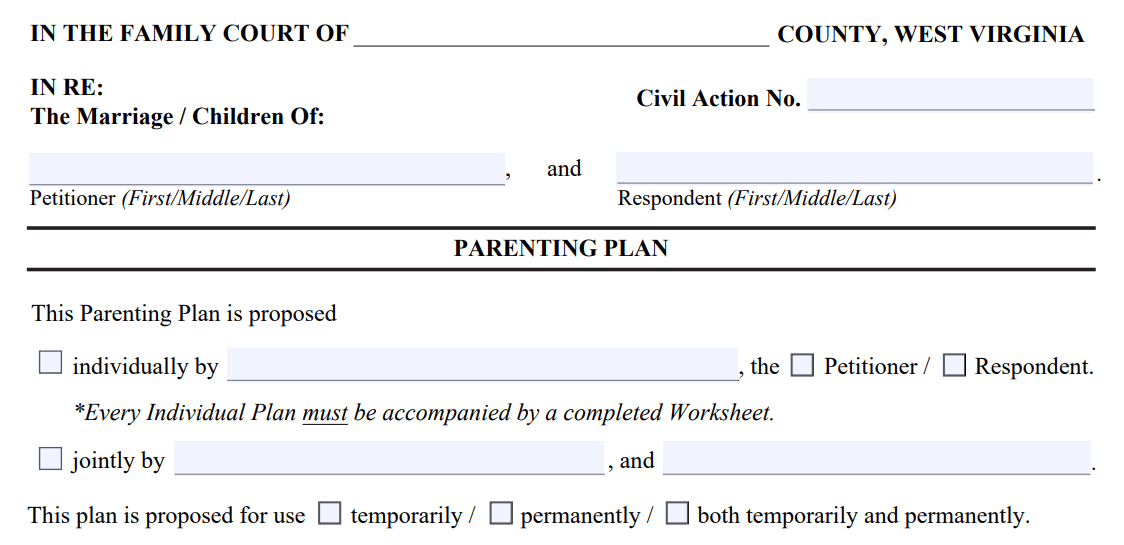Parenting Plans in West Virginia (Custody Agreements)
In West Virginia, parenting plans lay out how parents will share time with their children and the responsibility of making decisions for the children. The parenting plan becomes part of your final custody order.
Reaching agreement
Proposed parenting plans are key to helping the court decide temporary and permanent physical and legal custody arrangements.
If parents reach an agreement, they can prepare a joint proposed parenting plan. You must get your form notarized before turning it in with the court. If you hire a mediator, they will submit the form to the court on your behalf. They will also appear in court if a hearing is scheduled.
If parents cannot agree, they each prepare an individual proposed parenting plan. Then they must attend mediation to try to agree on a joint plan.
Try this with Custody X Change.
Parenting plan templates
You can use West Virginia's template or another of your choosing like Custody X Change's parenting plan template — just make sure you include the same required information.
You can find the state's template along with parenting plan instructions among West Virginia's family court forms. At the top of your plan, select whether you are submitting the plan individually or jointly, and whether you are proposing a temporary or permanent plan or both.

The Custody X Change template offers more provision options, which you can choose from to make a single plan or add onto West Virginia's template (See "Adding more to your plan" below).
 Try this with Custody X Change.
Try this with Custody X Change.
What you must include in your plan
At a minimum, include custody schedules and parameters for decision-making authority.
Your parenting time schedules should cover the day-to-day, holidays and summer breaks. They specify exactly what times the child will go from one parent's home to the other. Even if you propose parents get 50/50 parenting time, you must name one parent the primary residential parent.
Decision-making parameters should specify whether one parent will make all major child-related decisions, parents will have equal say in all decisions or each parent will have authority over certain decision categories. It's also helpful to state whether you'll consult with a third party like a parenting coordinator to help resolve disagreements.
Submitting a plan individually
Individual proposed parenting plans inform the court of the parenting arrangement one parent believes is best for the child.
In addition to the parenting plan, you must complete the following forms:
- Motion to Adopt Individual Proposed Parenting Plan
- Worksheet for Individual Proposed Parenting Plan
After filing for custody, you might get a scheduling order setting case deadlines, like for submitting your plan. If not, submit your plan at least five days before your first hearing so the judge can consider it when making a temporary order.
You must provide service of the above forms (plus your parenting plan) to the other parent. It's recommended you serve via first class mail. After mailing the forms, file a Certificate of Service with the court so they know you served.
After you file and serve your plan
At your first hearing, the court will make a temporary order based on each proposal (or one proposal if a parent didn't submit one). Then, you'll be referred to a premediation scanner.
The scanner will interview each parent individually to determine whether mediation is appropriate. If they find that it is, the court will order you to attend mediation with a court-approved mediator. If you cannot afford the cost, you can ask for a fee waiver.
Mediation usually takes one session.
If you agree on a joint plan (at mediation or otherwise), you can turn it into the court. You'll have a hearing where a judge will determine whether it should become the permanent parenting plan.
If there's no agreement, the court will schedule one or more dates for a trial (also known as a final hearing). Here, parents make their final arguments for their individual plan and any other terms they're asking for (e.g., property division in divorce).
Submitting a plan jointly
Joint proposed parenting plans detail custody agreements between parents.
Unlike individual plans, joint plans don't require additional paperwork or service. You'll also spend minimal time in court.
After you file your plan
After you submit your joint plan, the court will schedule a hearing.
The judge will review your joint plan to make sure:
- It is in the child's best interests.
- Both parents agree to the plan's terms.
- Neither parent was coerced into signing.
The court may make changes to the plan so it's more suitable for the child.
Adding more to your plan
Make additions to your parenting plan with Custody X Change.
With more than 140 categorized provisions, the online co-parenting app makes it easy to add all the information you'll need to handle parenting apart.

Add any topic you think you might struggle with on your co-parenting journey. Topics you may cover include:
- Parenting time when a parent is unavailable: When a parent is unavailable to exercise their regular parenting time, will you hire a babysitter or give the other parent a chance to have the time?
- Claiming the child on taxes: Will parents take turns claiming the child each year? Will one parent claim the child every year?
- Traveling with the kids: How much notice must a parent give before taking a trip with the kids? Must they provide an itinerary to the other parent? Can they get the child a passport?
- Alcohol and drug use: If drugs or alcohol are an issue, stipulations can be put in place to bar parents from drinking or drug use before or during parenting time, and requiring screening prior to parenting time.
Staying on top of co-parenting is a big task. Custody X Change makes it easier.
